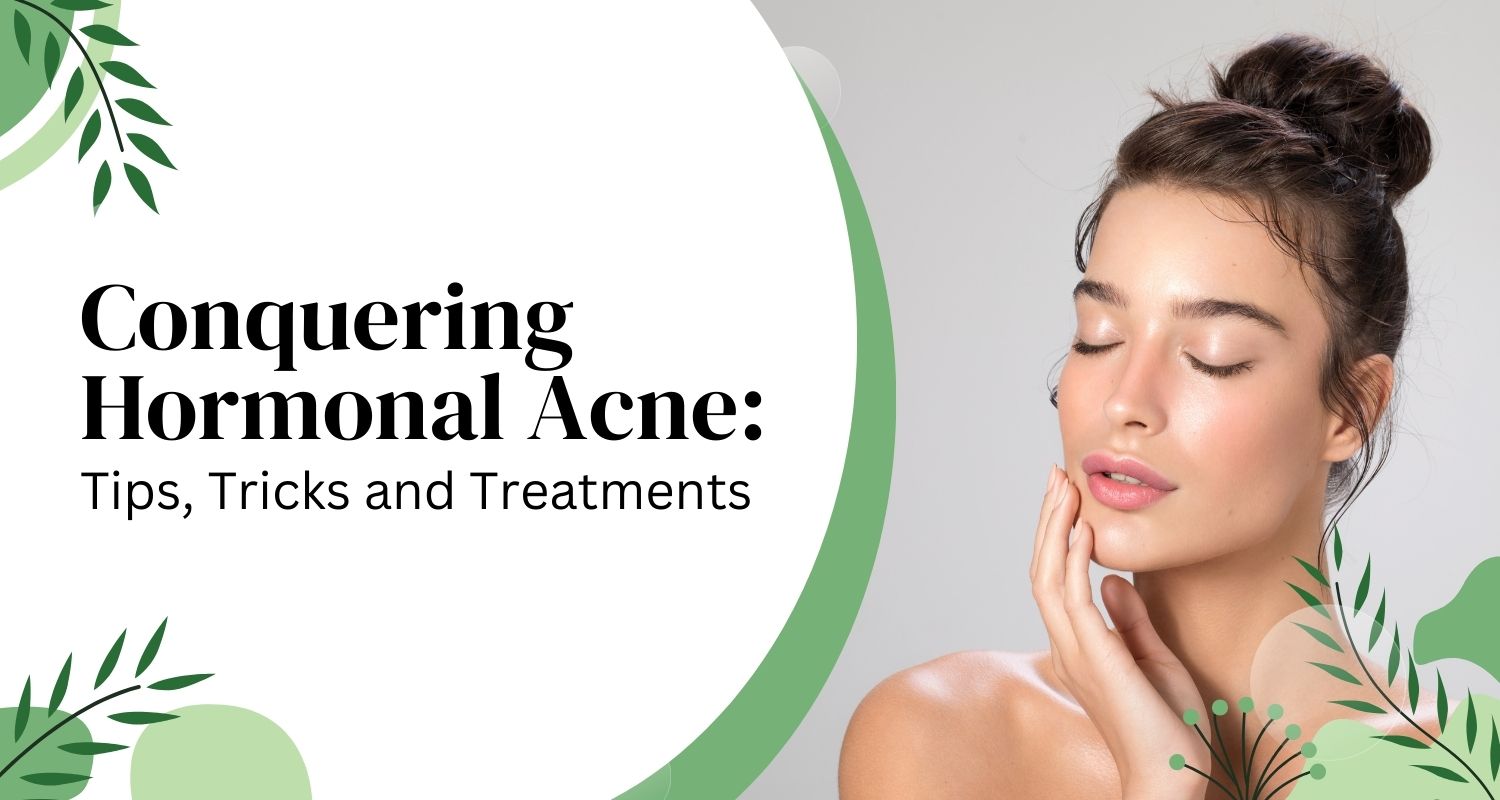Acne is a common skin condition that affects people of all ages and genders. However, there is one particular type of acne that primarily targets individuals with specific hormonal imbalances—hormonal acne. If you’ve ever experienced those persistent and often painful hormonal pimples that seem to appear like clockwork during your menstrual cycle or on your jawline, you’re not alone.
What is Hormonal Acne?
Hormonal acne, also known as period pimples or female breakouts on the jawline, is a type of acne that primarily occurs due to hormonal fluctuations in the body. While acne can develop on various parts of the face and body, hormonal acne tends to concentrate around the jawline, chin, and occasionally the neck and back.
Unlike common acne, which might be attributed to excess oil production or clogged pores, hormonal acne’s root cause is, as the name suggests, hormones.
Causes of Hormonal Acne
Hormonal acne is predominantly triggered by fluctuations in hormones, particularly androgens such as testosterone. These hormones stimulate the sebaceous glands in the skin to produce excess oil, leading to clogged pores and pimples on the jawline and other areas.
Here are some common causes of hormonal acne:
- Menstrual Cycle: Many women experience hormonal acne flare-ups in sync with their menstrual cycle. This is often referred to as “period pimples” and occurs due to the hormonal changes that happen before and during menstruation.
- Polycystic Ovary Syndrome (PCOS): PCOS is a common hormonal disorder that can cause an imbalance in sex hormones, leading to hormonal acne. Individuals with PCOS often have elevated androgen levels, which contribute to breakouts on the jawline and other areas.
- Pregnancy: Pregnancy induces significant hormonal changes in the body, and some women may experience hormonal acne during this time.
- Menopause: As women approach menopause, hormonal fluctuations can lead to adult-onset hormonal acne.
- Stress: Chronic stress can disrupt hormonal balance, leading to increased androgen production and, subsequently, hormonal acne.
- Birth Control Pills: The use of specific birth control methods can affect hormone levels, either positively or negatively, leading to hormonal acne in some cases.
- Diet: While not a direct hormonal cause, a diet high in refined sugars and dairy products can exacerbate hormonal acne in some individuals.
Treatments for Hormonal Acne
Now that we understand the root causes of hormonal acne let’s explore some effective treatments and strategies to manage and prevent those persistent pimples on the jawline and elsewhere.
- Topical Treatments: Over-the-counter and prescription topical treatments containing ingredients like benzoyl peroxide, salicylic acid, or topical retinoids can help reduce inflammation and unclog pores. These can be effective for mild to moderate hormonal acne.
- Oral Medications: In more severe cases, dermatologists may prescribe oral medications such as oral contraceptives (birth control pills), spironolactone, or oral antibiotics to help regulate hormones or reduce inflammation.
- Hormone Therapy: For individuals with PCOS or other hormonal imbalances, hormone therapy may be recommended. This can involve medications like metformin or anti-androgen medications to balance hormone levels.
- Lifestyle Changes: Managing stress through relaxation techniques like yoga, meditation, or exercise can help regulate hormones and reduce acne flare-ups. Maintaining a balanced diet low in sugar and dairy products may also be beneficial.
- Regular Skincare Routine: Establishing a consistent skincare routine can help manage hormonal acne. Use a gentle cleanser, avoid harsh scrubbing, and opt for non-comedogenic moisturizers and sunscreen.
- Natural Remedies: Some individuals relieve hormonal acne through natural remedies like tea tree oil, green tea extracts, or evening primrose oil. However, it’s essential to consult with a dermatologist before trying these options.
- Avoiding Trigger Factors: Identify specific triggers that exacerbate your hormonal acne. This could include certain cosmetics, hair products, or foods, and we should take steps to prevent them.
- Consult a Dermatologist: If hormonal acne is persistent or causing emotional distress, it’s crucial to seek the guidance of a dermatologist. They can recommend tailored treatments and monitor your progress.
How to Prevent Hormonal Acne?
Prevention is always better than cure. While hormonal acne can be challenging to prevent completely, there are steps you can take to minimize its occurrence:
- Maintain Hormonal Balance: If you suspect a hormonal imbalance, consult a healthcare professional who can recommend appropriate treatments or lifestyle changes.
- Cleanse and Moisturize: Keep your skin clean and moisturized with suitable products for your skin type. Avoid harsh or excessive cleansing, as it can irritate the skin.
- Healthy Diet: Incorporate a balanced diet rich in fruits, vegetables, whole grains, and lean proteins. Limit sugar and dairy intake, as these can exacerbate hormonal acne in some individuals.
- Stay Hydrated: Drinking plenty of water helps keep your skin hydrated and may improve its overall health.
- Sun Protection: Use sunscreen daily to protect your skin from harmful UV rays, which can worsen acne and cause skin damage.
- Manage Stress: Implement stress-reduction techniques such as yoga, meditation, or deep breathing exercises to control stress levels.
Conclusion
Hormonal pimples, particularly those that appear on the jawline, chin, or during specific times of the menstrual cycle, can be frustrating and challenging to manage. Understanding the root causes of hormonal acne is the first step in finding effective treatments and prevention strategies.
Remember that what works for one person may not work for another, so it’s essential to consult with a dermatologist to develop a personalized plan for managing hormonal acne. With the right approach, clear and healthy skin can be within reach, even in the face of hormonal fluctuations.

